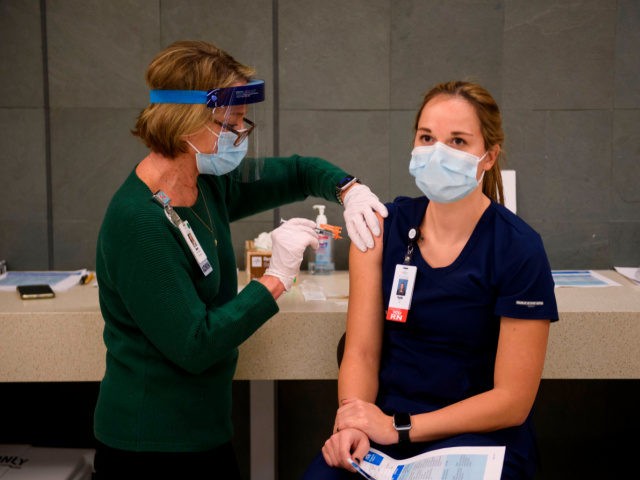California is the first state in the country to mandate vaccines for healthcare workers, with few exceptions, the California Department of Public Health announced Thursday.
The department, via Dr. Tomás J. Aragón, California’s public health officer, issued an order forcing healthcare workers to get vaccinated for the Chinese coronavirus. They have until September 30 to complete their vaccination series.
All “hospitals, skilled nursing facilities (SNFs), and the other health care facility types identified in this order are particularly high-risk settings where COVID-19 outbreaks can have severe consequences for vulnerable populations including hospitalization, severe illness, and death,” the August 5 order reads, touting the availability of vaccines in the Golden State.
“Vaccination against COVID-19 is the most effective means of preventing infection with the COVID-19 virus, and subsequent transmission and outbreaks,” the order reads.
“As we respond to the dramatic increase in cases, all health care workers must be vaccinated to reduce the chance of transmission to vulnerable populations,” it continues.
“For these reasons, COVID-19 remains a concern to public health and, in order to prevent its further spread in hospitals, SNFs, and other health care settings, new public health requirements are necessary at this time,” it adds.
There are limited exemptions, which can be based on religious beliefs or a qualifying medical reason:
To be eligible for a Qualified Medical Reasons exemption the worker must also provide to their employer a written statement signed by a physician, nurse practitioner, or other licensed medical professional practicing under the license of a physician stating that the individual qualifies for the exemption (but the statement should not describe the underlying medical condition or disability) and indicating the probable duration of the worker’s inability to receive the vaccine (or if the duration is unknown or permanent, so indicate).
Those who receive the exemption will be subjected to testing twice a week for workers in health care and long-term care facilities, and once a week for others. They must also wear a surgical mask or “higher-level respirator approved by the National Institute of Occupational Safety and Health (NIOSH), such as an N95 filtering facepiece respirator, at all times while in the facility.”
“As we continue to see an increase in cases and hospitalizations due to the delta variant of COVID-19, it’s important that we protect the vulnerable patients in these settings,” Aragón said in a statement, declaring that the action will “ensure that health care workers themselves are protected.”
“Vaccines are how we end this pandemic,” Aragón proclaimed.
Various hospital systems across the country have outlined their plans requiring healthcare workers to receive vaccinations as a condition of continued employment.
On Sunday, hundreds of people, including healthcare workers, gathered in Charlotte, North Carolina, to protest Atrium Health’s and Novant Health’s recent announcement requiring workers to be vaccinated.
“I’m not going to be forced to take an experimental vaccine that potentially could injure me or kill me,” Jane Nymberg, a registered nurse who has worked at Atrium for more than two decades, said. “The chances of that are low. But if it happens, I will be responsible.”
“I don’t think that, I don’t believe it’s right to put that kind of choice in front of somebody,” another nurse added.

COMMENTS
Please let us know if you're having issues with commenting.